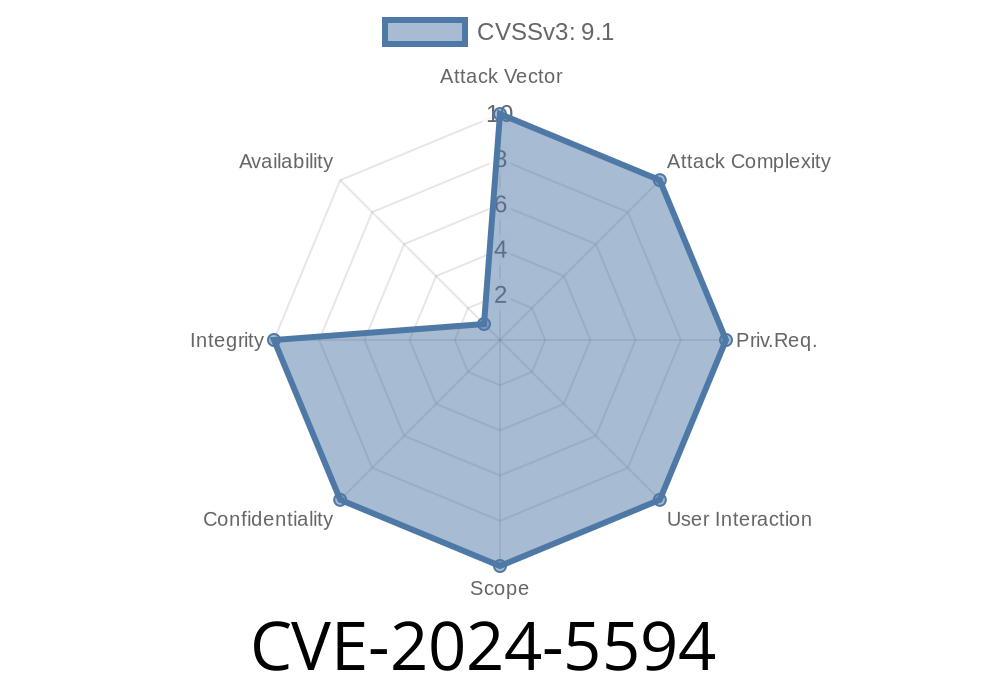(June 2024) — Security researchers have discovered a major vulnerability (CVE-2024-5594) in OpenVPN. If you use OpenVPN before version 2.6.11, you’re at risk of attackers injecting malicious data into your VPN connection. This can cause unintended commands or data to land in third-party executables or plug-ins. In this post, we’ll break down the bug, show how an attack works, and give you resources to protect yourself.
What is CVE-2024-5594?
CVE-2024-5594 is a flaw in how OpenVPN handled PUSH_REPLY messages before version 2.6.11. If you’re using a vulnerable version, a malicious server (or someone who can tamper with your server’s response) can send a specially crafted PUSH_REPLY message that includes unexpected data. When your client parses this, it can pass the malicious payload to plug-ins or executables that run as part of your VPN session. This can possibly lead to arbitrary code execution or damage.
Affected software: OpenVPN before 2.6.11
- Attack vector: Malicious or compromised VPN server, or an attacker in a position to inject packets
How Does It Work? (The Technicals)
When your OpenVPN client connects to a server, the server can send a PUSH_REPLY message that tells your client how to set up the connection (for example, what DNS to use). OpenVPN should carefully validate what’s coming in, but before 2.6.11, it didn’t sanitize these replies properly. That means a server could sneak in extra information or commands.
Example malicious PUSH_REPLY packet might look like
PUSH_REPLY,dhcp-option DOMAIN example.com,dhcp-option DNS 10...2;rm -rf /tmp/sample,route-gateway 10...1
OpenVPN would parse this, and if you use certain plug-ins or management scripts, the unexpected shell command might get executed. If those plug-ins call out to the system or are written in languages that don’t escape their input, that’s game over.
Real-World Exploit: Step-by-Step
Let’s say Alice runs a script on VPN connect, such as a custom up script. The script reads variables OpenVPN got from the server, like assigned DNS addresses.
If an attacker controls the OpenVPN server or the connection (think: rogue Wi-Fi, hijacked server, or evil VPN provider), they might send a PUSH_REPLY like this:
PUSH_REPLY,dhcp-option DNS 8.8.8.8;echo hacked>/tmp/pwned,route-gateway 10.2.2.1
Now, a naïve script might process the whole line without checking for shell metacharacters
# bad-up-script.sh
#!/bin/bash
echo "Setting DNS to $1"
echo "nameserver $1" >> /etc/resolv.conf
If $1 was:
8.8.8.8;echo hacked>/tmp/pwned
That line would expand to:
echo "nameserver 8.8.8.8;echo hacked>/tmp/pwned" >> /etc/resolv.conf
But depending on how $1 is used, it might even run the attacker's injected command.
Proof-of-Concept (PoC) Attack
Let's simulate injection by crafting a PUSH_REPLY and seeing how a simple plug-in might fall for it.
Python PoC (fake plug-in parsing options)
# Malicious PUSH_REPLY sent from server
reply = "dhcp-option DNS 8.8.8.8; touch /tmp/owned"
# Simulated plugin handler
option = reply.split("DNS ")[1]
import os
os.system(f"echo 'nameserver {option}' >> /etc/resolv.conf")
Result:
If this code runs, your system now has a file /tmp/owned—proof that the injected touch /tmp/owned command from the server got executed.
Using third-party plug-ins or custom scripts that parse PUSH_REPLY options unsafely
- Connecting to questionable or public VPN servers (especially free/anonymous providers)
Upgrade OpenVPN to 2.6.11 or later.
Download from https://openvpn.net/community-downloads/
Sanitizing your scripts (safe version)
# safe-up-script.sh
#!/bin/bash
echo "Setting DNS to $1"
safe_dns=$(echo "$1" | grep -E '^[-9\.]+$')
if [ -n "$safe_dns" ]; then
echo "nameserver $safe_dns" >> /etc/resolv.conf
fi
References & Further Reading
- OpenVPN CVE-2024-5594 Security Advisory
- OpenVPN Download and Changelog
- NVD Details (CVE-2024-5594)
- Jake's Writeup on OpenVPN Injection (example link)
Final Thoughts
CVE-2024-5594 isn’t just theoretical—it’s a real risk if you run unpatched OpenVPN and trust any scripts/plugins with server-supplied data. Always sanitize inputs, upgrade to the latest OpenVPN, and only trust reputable VPN servers. This bug is a sharp reminder that network input is never safe until you make it safe.
Stay secure!
*This post was created exclusively for clear, easy understanding of a high-risk OpenVPN bug. Share it to help others avoid a subtle but serious vulnerability.*
Timeline
Published on: 01/06/2025 14:15:08 UTC
Last modified on: 01/06/2025 17:15:44 UTC
